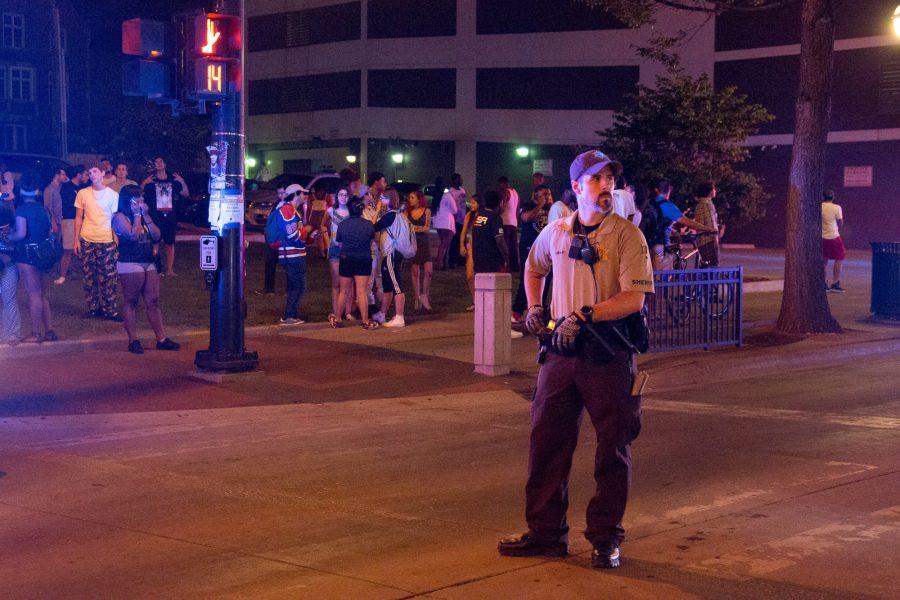Place blame on shooters, not victims
Students gather at the intersection of Green and Fourth Street after a shooting that took place early Sunday morning.
October 3, 2016
 “What were you wearing?” “Why were you alone?” “Why were you drinking?”
“What were you wearing?” “Why were you alone?” “Why were you drinking?”
These questions have all become synonymous with victim blaming, particularly toward sexual assault survivors.
By this point they sound ridiculous — that anyone would think the victim is ever at fault is beyond me. But in the wake of the Green Street shooting, students proved that these victim-blaming attitudes are not only present, but that they expand beyond sexual assault.
When the violent attack that took one man’s life shook campus on the morning of Sep. 25, the last things I expected to hear were these kinds of statements that cast blame on the victims.
The Daily Illini interviewed random students about their perceptions on campus safety after the shooting, and they all agreed that they still felt safe on campus. Students attributed this to their tendencies to “stay out of trouble.”
Get The Daily Illini in your inbox!
The students were all ignorant to the fact that the victims of the shooting were bystanders uninvolved in the fight. But there’s no excuse for uninformed opinions. The multitude of updates from the UIPD informed all students of the details of the situation, specifically that the victims were uninvolved in the initial altercation.
It’s disheartening to see that students blame the victims for the senseless attack they had to endure. But it makes sense considering the strategies people often use to convince themselves they are safe.
For example, it’s common for people to attribute sexual assault to a culture of binge drinking. A girl then might tell herself, “If I don’t drink, I won’t get sexually assaulted.” This makes her feel safer by distracting herself from the fact that anybody can be a victim of sexual assault, but it also dangerously places the blame on the victims.
A parent might say, “If my daughter carries pepper spray, she won’t get attacked.” Again, this might make us feel safer, but it makes victims responsible for prevention, not perpetrators.
Every girl who received pepper spray as a going-away present knows this feeling. Every person who keeps their keys between their fingers while walking to their car can relate. But what happens when using your makeshift claws can’t protect you from a bullet?
You might hear: “Why were you out at night?” “Why were you drinking?” “Why did you put yourself in that situation?”
The same phenomenon is occurring with respect to the shooting. The students who blame “finding trouble” are giving themselves a sense of false security. They believe if they stay out of trouble, they won’t be a victim of gun violence. Simple as that.
Anything that can detract from the actual violent act will make people feel safer and make them think that it won’t happen to them. But the reality is that tragedies don’t discriminate. A dangerous man with a gun doesn’t care if you have pepper spray, or if you’re using the buddy system.
It’s time to start placing the blame where it matters. Blaming the victims is not only emotionally harmful, but is completely unproductive in solving the issue. It’s also a testament to how far we will go as a society to avoid facing challenging discussions head-on.
There is nothing easy about the discussion on gun control. It’s not a dialogue anyone wants to have, whether it be on the senate floor or at Thanksgiving dinner. But it’s a discussion we have to partake in if we want these tragedies to yield.
A single gun is not only to blame for this tragedy. But the reality is that a dangerous man, who should have never had access to a gun in the first place, shot and killed an innocent bystander enjoying a night out.
We as a society need to rethink the way we approach these issues. It feels better to be coddled and told we will never experience these situations as long as we carry pepper spray and stay in groups, but the discussion needs to shift away from how to not be a victim to how to not be a perpetrator.
We need to have the uncomfortable conversations that will shift the violent paradigm our society faces.
Isabella is a sophomore in ACES.







